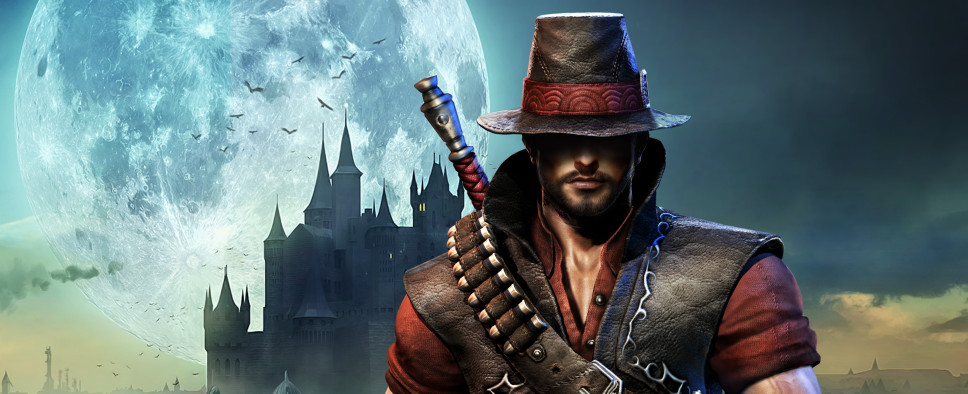Victor Vran Review
-
Category: ReviewsHits: 13008

Article Index
Introduction
Victor Vran is a new action role-playing game from Haemimont Games, which is probably best known for its work in the strategy genre, including Tropico 3-5 and Omerta: City of Gangsters. The game features the voice work of Doug Cockle in full Geralt of Rivia mode (or maybe that's his regular voice), and it takes place in the steampunk middle European city of Zagoravia, and so it feels like it's the child of The Witcher and The Incredible Adventures of Van Helsing, just with a heaping helping of difficulty added on.
Characters
In the game you control Victor Vran, a demon hunter with a checkered past. You don't get to make any permanent choices about your character. There aren't any classes or races or attribute points or skill points or anything like that, and obviously you can't change your name or your gender. Each time you gain a level, you simply earn a fixed bonus -- usually extra health, but sometimes a new equipment slot or something else. That means the only way you can define your character is by the equipment you wear.
Fortunately, the game gives you some nice options for equipment. There are eight kinds of weapons, including swords, hammers, and shotguns, and each one behaves a little differently. For example, hammers are slow but powerful, while swords are quicker but weaker. Weapons also have two abilities associated with them, which helps to differentiate them even more. Swords can daze opponents, shotguns can knock enemies back, and hammers have built-in life-steal. Using one weapon isn't anything like using the others, and since there aren't any weapon proficiencies, that means you can try them all out until you find one that suits your playing style.
Your clothing makes a difference as well. There are something like ten outfits available in Victor Vran, and what they primarily do -- other than provide you with some defense against attacks -- is affect how you gain overdrive, which is the "mana" in the game. By default you only receive overdrive when you damage enemies, but some outfits generate it automatically (with no defense) while others hinder its growth (but provide extra defense). Once you've earned enough overdrive, you can use it to cast demon powers, including Sanguine Aura (which restores health), Meteor (which causes fireballs to fall from the sky), and Time Bubble (which slows down enemies).
But probably the most interesting type of equipment in the game is the destiny card. As you gain levels, you eventually unlock five destiny card slots and 20 destiny points. Each card has a point cost and some sort of passive bonus that it gives you. Some cards are standard, like The Vampire (which gives health steal), The Moon (which causes an explosion when you deliver a critical hit), and Strength (which increases your critical chance), but others are unique, usually one for each weapon type. There are also "divine" and "wicked" prefixes for the cards, which give extra bonuses, and wildcards, which give bonuses based on how many cards you have equipped. I liked the destiny cards. They're a fun optimization problem to try and solve.
In total, characters can equip one outfit, two weapons, two consumables (potions or bombs), two demon powers, two weapons, and 5 (or 6 with the right outfit) destiny cards. That's not a lot of items, but everything you use can be upgraded in some way through transmutation, which allows you to combine items together. There are lots of recipes for this, and in general they require you to find lots of high-quality items, which in turn requires lots of grinding. Grinding is par for the course for most action RPGs. The problem with the grinding here is that there came a point when I no longer cared what the equipment was -- there wasn't any way anything I found was going to be better than what I had -- I only cared if the item was usable in a transmutation recipe. And so it's grinding that's more boring than usual.
Overall, the character / equipment system was a mixed bag for me. I liked the versatility. Changing your loadout is essentially the same as changing your character, and you can do it whenever you want -- even during combat. But I felt like I was playing a character rather than my character, and since characters don't really become more powerful, I also missed out on the feeling of evolution I get with other action RPG characters -- advancing from weak stripling at the start to all-powerful demigod at the end. Combined, I didn't form an attachment to my character, and I never developed any sort of drive to get him through the game or improve his gear.
Gameplay
The world of Victor Vran is presented using an isometric view. You're allowed to rotate the camera (which stays focused on your character), but you can't zoom in or out or change the pitch. Most foreground objects disappear when they're in the way, so for about 95% of the time you're given a clear view of your surroundings, and for the other 5% rotating the camera solves the problem. So the camera system works pretty well.

